
Fiction
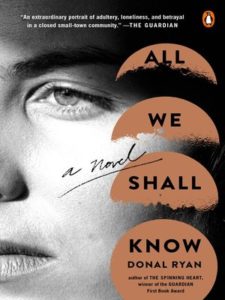
1. All We Shall Know by Donal Ryan
(5 Rave, 1 Mixed)
“Ryan’s choice of narrator, a character both deeply flawed and painfully guilty, shows him working in the great tradition of tragic fiction, his lonely adulteress coming to grief in the same shadowy spaces as Emma Bovary or Anna Karenina.”
–John Burnside (The Guardian)
Read an essay by Donal Ryan here
*
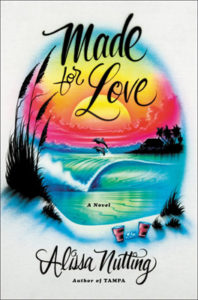
2. Made for Love by Alissa Nutting
(3 Rave, 2 Positive, 3 Mixed)
“There is no redemptive thesis in Made for Love whatsoever: when Hazel begins to gradually emerge from her chrysalis of pathos and male entrapment, she’s much the worse for what she’s gone through. Even so, the book is a total joyride, dizzying and surprising, like a state-fair roller coaster that makes you queasy for a moment but leaves you euphoric in the end.”
–Jia Tolentino (The New Yorker)
*

3. Spoonbenders by Daryl Gregory
(3 Rave, 1 Positive, 1 Mixed)
“Gregory has a wry, clear, powerful voice, and his characters leap off the page. They are charismatic enough to hold the attention, yet imbued with the kind of qualities that make them seem like people anyone might meet in their day to day lives.”
–Alyx Dellamonica (Tor)
Read an essay by Daryl Gregory here
*
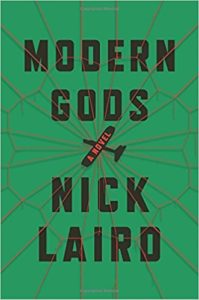
4. Modern Gods by Nick Laird
(2 Rave, 2 Positive, 3 Mixed)
“The characters in Modern Gods traverse oceans, time zones and political situations as part of Laird’s project to pry apart the very structures of worship and locate the systems they have in common, among them storytelling and ritual cruelty … Laird dazzles ear and eye with his kinetic prose, animating city, countryside and, later, tropical jungle.”
–Jennifer Egan (The New York Times Book Review)
*
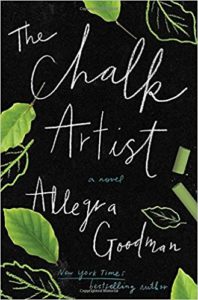
5. The Chalk Artist by Allegra Goodman
(1 Rave, 3 Positive, 3 Mixed)
“Goodman, like the best teachers, is intent on watching obsessive fantasies turn into imaginative determination. Readers will be too, pulled along by her protagonists’ quests, which are not to follow rules or slay dragons. The real goal is to face complicated selves.”
–Ann Hulbert (The Atlantic)
**
Non Fiction
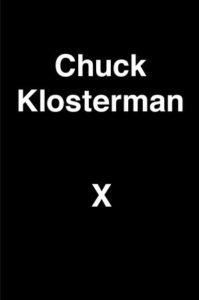
1.Chuck Klosterman X by Chuck Klosterman
(4 Rave, 2 Positive)
“Klosterman is a master of the high-low, his writing the rhetorical equivalent of Paul Rudd’s Amnesty International shirt in Clueless. He injects a level of intellectual rigor into subjects that receive precious little in comparison to their importance to the average person.”
–B. David Zarley (Paste)
Read an essay from Chuck Klosterman X here
*
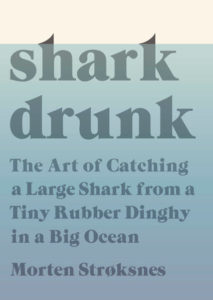
2. Shark Drunk by Morten Stroksnes, Trans. by Tiina Nunnally
(3 Rave, 1 Positive, 1 Mixed)
“In the hands of a less skilled storyteller, readers may have felt burdened by the amount of information, but Strøksnes handles it well … Whether the author is opining on mass extinctions, the importance of plankton, the history of lighthouses, or the epicurean treat of boiled cod tongues, readers will happily devour this smorgasbord of delights.”
-(Kirkus)
*
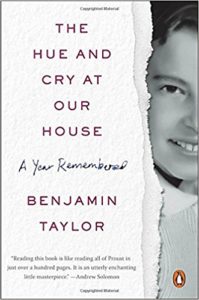
3. The Hue and Cry at Our House by Benjamin Taylor
(2 Rave, 2 Positive, 1 Mixed)
“..[a] lovely, gorgeously written memoir … It’s Taylor’s gift to readers to make that past hauntingly real for them, too, without the taint of nostalgia, which, he wisely argues, ‘lies.’ The truth is that this memoir is an unforgettable sharing of one boy’s life that contains universal truths in a style that demands to be quoted.”
–Michael Cart (Booklist)
*

4. Be Free or Die by Cate Lineberry
(1 Rave, 4 Positive)
“The book is a neat piece of narrative history, told with exceptional brio. It flows with energy and bravado. It’s also a crisp reminder that history is never tidy. Thanks, then, to Lineberry for reminding us of the existence of such people as Smalls.”
–Peter Lewis (The Christian Science Monitor)
*
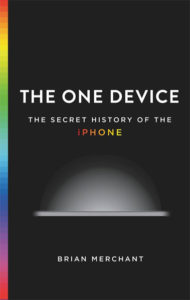
5. The One Device by Brian Merchant
(1 Rave, 2 Positive, 2 Mixed)
“Like the best historians, Merchant, an American journalist and editor of Vice Media’s technology blog, Motherboard, unpacks the history of the iPhone in a way that makes it seem both inevitable in its outline and surprising in its details.”
–Jacob Mikanowski (The Guardian)
***

